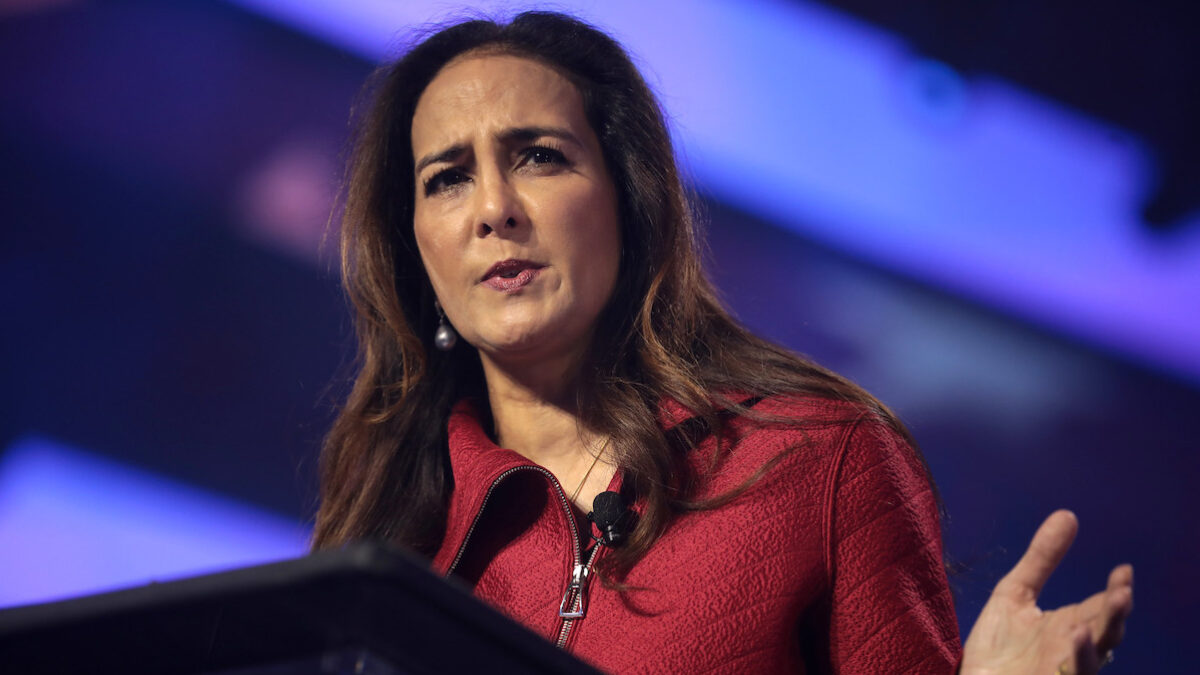With one day left before Republican committee members decide who will lead the national party into 2024 and beyond, the party’s two frontrunners, incumbent Republican National Committee chair Ronna McDaniel and California lawyer and RNC committeewoman Harmeet Dhillon, must make their case for why they are uniquely suited for the job. While many issues plague the national party, there is one item both candidates must wrestle with: election integrity.
For almost 40 years, the RNC was unable to oversee poll watcher operations or litigate elections due to a 1982 consent decree. In 1981, Democrats accused Republicans of voter intimidation in a New Jersey governor’s race. The case was settled after the GOP agreed to a court-ordered consent decree limiting Republican involvement with any poll-watching operations. Little did Republicans realize that Dickinson Debevoise, the Jimmy Carter–appointed judge behind the consent decree, would prove to be such a partisan; he never let the GOP out of the decree, and repeatedly altered and strengthened it at Democrats’ request. After Debevoise formally retired from the bench, he stayed on for 21 years in senior status, a form of semi-retirement allowing judges to keep serving in a limited capacity, and kept enforcing the decree. Only after Debevoise died did an Obama-appointed judge let the agreement expire at the end of 2018.
As a result, the Democratic National Committee had an almost four-decade advantage over the GOP. After spending a few years building out and developing poll-watching infrastructure since the consent decree was lifted, McDaniel told The Federalist the 2022 midterm was the first election cycle in which the RNC could fully operate. But in a recent op-ed for The Daily Wire, Dhillon blamed party insiders for using the consent decree as an excuse “for complete legal inaction on just about every front.”
Some major GOP donors are putting their money behind Dhillon as they lobby for new leadership of the RNC, after McDaniel’s three consecutive terms as chair of the party. Despite some influential support for Dhillon, McDaniel remains likely to be reelected after an endorsement letter signed by 107 of the 168 members of the RNC was circulated last month.
Still, the incumbent chairwoman isn’t taking any chances. During an interview with The Federalist, McDaniel repeatedly praised and defended the RNC’s record in the past election cycle, while also offering next steps for the party regarding election integrity. “We had three million more Republicans turn out than Democrats,” she noted.
Dhillon also spoke with The Federalist and talked about what has to change on the state and national level regarding the GOP’s election efforts.
Election Integrity Must Be a Year-Round Operation
Back in August 2021, after the RNC’s Committee on Election Integrity released a report on the comprehensive changes made to voting procedures in the wake of the Covid-19 pandemic, the RNC announced a “year-round election integrity operation” would be created. This included hiring in-state election integrity directors, training poll watchers, and engaging in election-related litigation.
But according to a letter sent to the RNC by the grassroots-organized Election Integrity Network, after the 2022 midterm elections, all state election integrity directors and field staff were terminated as of Dec. 15. While McDaniel reinstated four of the state election integrity directors after EIN officials expressed their concerns, those familiar with the matter say this is a symptom of a larger problem within the RNC: namely, that the RNC treated its election integrity division as a seasonal political operation, meaning any election integrity staff would be terminated after the election cycle was completed.
“Going forward, the RNC’s Election Integrity staff must be exempt from the layoffs to which RNC political staff are subject after every election,” the EIN coalition wrote.
In her Daily Wire op-ed, Dhillon wrote that the RNC’s election integrity operations were “a seasonal, vestigial effort grafted onto a political department itself staffed largely with less-experienced political operatives in the 2022 election cycle. And most of these operatives — even the handful of experienced ones – were laid off after election day, frittering whatever knowledge we had gained in this emerging field.”
When asked about the RNC firing the in-state election integrity directors, McDaniel disagreed with Dhillon’s characterization that the RNC’s election integrity teams were treated as seasonal employees. “There is some attrition after an election and people move on. But Josh Findlay [the national election integrity director] was running our office and continued to run our office. We are keeping those election integrity directors — some of them, not all of them. There is always a little ramp down after an election, but our election integrity program has never stopped,” she said.
As RNC chair, Dhillon said she would invest in a year-round Election Operations Department to help the party adapt to the post-2020 voting environment.
McDaniel also said moving forward she would create a “standalone department for election integrity.” During the 2022 cycle, election integrity operations were housed between the legal and political divisions of the RNC.
“I think, to be more successful going forward, it should just be its own standalone department,” McDaniel said.
Litigate, Litigate, Litigate
The past midterm election cycle was the most litigious in RNC history. A representative for the RNC told The Federalist the GOP had engaged in 91 election-related lawsuits alone, and McDaniel repeatedly praised the RNC’s litigation efforts, citing many examples of how the national party’s legal presence impacted races across the country. “In Virginia alone, we had 500 lawyers on the ground and a war room of 30 lawyers triaging issues in real time,” she said.
“The RNC has never done this before,” McDaniel declared. “And I put our investment and our resources to the test. But we did it. And everyone should be pleased with the results.”
While Dhillon acknowledged the RNC’s expanded litigation efforts, she emphasized that the RNC is not doing enough and needs to be spending double what it currently does. Dhillon noted that during the past cycle, the RNC declined to file lawsuits over budget constraints.
“Democrats have really downgraded the integrity of our elections through litigation,” Dhillon told The Federalist. “We have not met or matched that at all, and we have to start playing catch-up.”
In the past election cycle, Dhillon observed, the RNC took a mainly defensive posture. “We intervened in a portion of the lawsuits filed by the Left, both for the RNC and on behalf of state Republican parties. We filed amicus briefs in litigation initiated by others. What we did not do is initiate much of our own litigation, put the Left on its heels, or leave any lasting marks on our opponents,” she wrote in The Daily Wire.
Because of the consent decree, Dhillon added, there is a critical shortage of GOP election lawyers, so the RNC must focus its resources on finding, funding, and training them so as to be competitive with their Democratic counterparts.
As RNC chair, Dhillon would allocate more resources to funding litigation — particularly offensive litigation.
“We need to be filing lawsuits in blue states, and in red states where Democrats have successfully bastardized our election laws,” Dhillon said. “Right now, if I were RNC chair, I’d be working with the Arizona GOP to recall the Board of Supervisors in Maricopa County for violating the civil rights of hundreds of thousands of voters in their state by failing to properly test vote center equipment and train election workers.”
Building a Lasting Election Integrity Infrastructure
Building a year-round election integrity operation will take more than just doubling down on litigation efforts, however.
Dhillon told The Federalist the RNC must invest significant resources in beating the Democrats on early voting. Now that Election Day has turned into ‘election week’ or ‘election month,’ Republicans must invest in personnel to chase early votes and cure ballots in states that allow for early voting.
“In California, we’ve mastered it,” Dhillon said. “In targeted congressional races where every vote is going to matter, we go and chase those ballots and get signatures fixed with paid and volunteer staff doing it. That’s done with really no training input from the RNC and frankly, the RNC has shied away from talking about these issues because a lot of our Republican activists are opposed to early or mail voting in any form.”
As RNC chair, Dhillon said she would also bring that model to the rest of the country. “With a relatively small investment in the relevant states, we can initiate and track Republican vote-by-mail applications, outgoing ballots, and returns,” Dhillon wrote. “We can train volunteers in ballot harvesting to do it transparently and ethically wherever it’s legal.”
When asked about the RNC’s ground game, McDaniel said the RNC must focus on engaging communities that have historically voted Democrat. In the last election cycle, the RNC made inroads with black, Hispanic, and Native American voters through its establishment of 38 community centers across the country, according to a representative of the RNC.
“The first office we opened was in Michelle Steel’s district in Little Saigon in California — one of the most diverse districts in the country, and a D+7 district,” McDaniel said. “And that engagement with the Vietnamese community sustained for over a year was a difference maker, and you can talk to Michelle about it. These are the types of things the RNC must be doing long term.”
Cleta Mitchell, a senior legal fellow at the Conservative Partnership Institute and founder of the Election Integrity Network, told The Federalist that winning elections isn’t just about how you collect votes.
“It’s about matching what the left has done in terms of building an infrastructure,” Mitchell said, mentioning, among other things, Democrats’ well-funded programs to register thousands of college students to vote every year.
“There’s just a complete cultural difference,” Mitchell said. “And nowhere is this more evident than the RNC putting its election integrity unit within the political division and then firing everybody six weeks after the election as though they were seasonal campaign operatives.”
What’s Next
It is ultimately up to the 168 national committee members to decide who they want as chair. While both candidates are strong leaders, they both acknowledge much has to be done on the election integrity front, including recruiting poll watchers and workers, dealing with ballot harvesting and turnout operations, as well as litigating election cases.
Regardless of who wins on Friday, both candidates agree the culture of the Republican Party must shift to focusing on the entire election process, whether it is passing strong legislation, cleaning state voter rolls, embracing (or rejecting) new technology, or investigating error-ridden voting systems. The GOP is likely to go on offense and take an aggressive approach to litigating the country’s election processes, just like their Democratic counterparts. Now it’s up to the Republican committee members to decide who will be leading the charge on election integrity in the next presidential election.








